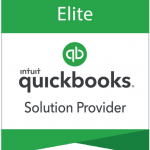Both QuickBooks Online and Sage Business Cloud Accounting have invoicing, banking, income and expense tracking, and financial reporting features. However, QuickBooks Online is more comprehensive, especially in terms of time tracking and inventory management.
If you’re choosing between QuickBooks Online and Sage Business Cloud accounting for your business, then keep reading as we will compare the basics of the two programs to help you decide.
Ease of Setup and Use
While it’s not difficult to set up a company in both QuickBooks Online and Sage Cloud Accounting, QuickBooks Online is significantly more flexible as it allows you to import beginning balances and charts of accounts—something you can’t do with Sage Business Cloud Accounting. This means that if you’re currently using another accounting software, you have to manually enter the accounts that are not included in the default list of charts of accounts.
Banking
Both programs allow you to create bank feeds and reconcile your bank accounts. You can also choose to manually import your transaction if you’re not comfortable connecting your bank or credit card account. While the reconciliation process is the same for both programs, QuickBooks Online is preferable if you have a large volume of transactions. Sage Business Cloud Accounting might be enough if you have a few transactions to handle.
Accounts Payable
QuickBooks Online beats Sage in terms of accounts payable (A/P) management. Both products let you manage and track unpaid bills and manage vendor contact information, but QuickBooks Online does some other things that Sage Business Cloud Accounting can’t. For instance, Sage doesn’t let you record purchase orders and create a digital transaction from an uploaded expense receipt. If you work with multiple vendors and suppliers and want a strong solution for managing your bills, then QuickBooks Online may be a better fit.
Accounts Receivable
QuickBooks Online is also more flexible than Sage Business Cloud Accounting in terms of invoicing. Both programs allow you to create, customize and send invoices to your customers. You can email and print invoices in both software as well. However, QuickBooks Online has other features not available in Sage Business Cloud Accounting, such as the ability to add unbilled labor and expenses to invoices and immediately issue a sales receipt after a sale is made.
Inventory
QuickBooks Online offers more options for tracking inventory, making it an ideal option for product-based businesses like retailers. QuickBooks Online and Sage Business Cloud Accounting both enable you to create an inventory item and view the total units and total cost of available items. However, QuickBooks Online takes it one step further by allowing you to track inventory on purchase orders and track inventory using the average cost or the Last-In, First-Out (LIFO) method.
When to Use Sage Business Cloud Accounting?
You might do well with Sage Business Cloud Accounting if you only need basic bookkeeping. If you only need a simple solution for tracking income and expenses, sending invoices, and running reports, then Sage Business Cloud Accounting is a good option. Sage Business Cloud might be good for very small businesses, but not for those that need comprehensive accounting features.
When to Use QuickBooks Online?
You might prefer QuickBooks over Sage Business Cloud Accounting if you manage employees and need to track time worked. QuickBooks Online helps you track billable hours and then bill them to customers for invoices. It also integrates with QuickBooks Payroll, so you can pay your employees by check or bank transfer. QuickBooks Online is also better for inventory, as explained earlier. Another reason to use QuickBooks Online is that QuickBooks has a large network of QuickBooks ProAdvisors, which means you can easily find a local bookkeeper to help you keep your books in order.
Explore the benefits of QuickBooks Online and what it can do for your business.
Smart Tip: When choosing among the four plans of QuickBooks Online, make sure to consider the number of users you have and the features you need. For instance, if you are a solo user and you only need basic income and expense tracking, QuickBooks Online Simple Start might be sufficient. If you are a larger enterprise with up to 25 users and want more options for automating workflows, then you may choose QuickBooks Online Advanced.
For more information, check out our comparison of QuickBooks Online plans.


















